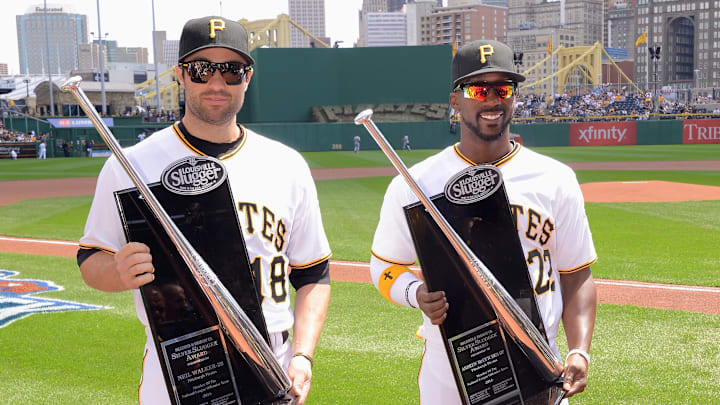Had the Silver Slugger Award existed during the heyday of baseball in Pittsburgh, the Pirates would be as well represented in the history of the award as they are in the halls of Cooperstown. Unfortunately, Hillerich & Bradsby (the company that owns Louisville Slugger) created the award in 1980, and since the Pirates have the second-worst slugging percentage over the past 45 years, the club’s representation is fairly scant. Still, it is worthwhile to look back and celebrate the sluggers of years gone by.
Complete history of Pittsburgh Pirates' Silver Slugger Award winners
The GOAT
No player is more associated with the 21st century version of the Pirates than Andrew McCutchen, and fittingly, no player in organization history has more Silver Sluggers than Cutch. The outfielder’s first such honor came in 2012 (also the year of his only Gold Glove Award) when the position was in a bit of a flux. Ryan Braun, Matt Holliday, and the sluggers of the 2000s were on their way out, and Juan Soto, Mookie Betts, and the stars of today had yet to emerge.
As a result, McCutchen’s companions during his four-year winning streak (2012-15) are an odd bunch: Jay Bruce, Michael Cuddyer, and Carlos González, for example, had flash-in-the-pan seasons. McCutchen, though, remained constant. He’s not going to be up for any awards this season, but he still stands for what once made Pittsburgh baseball exciting and what could be in the future.
The Killer B’s and Van Slyke
In the early 1990s, the Pirates had one of the most complete outfields in baseball. Bobby Bonilla, who shifted from third base (where he had won a Silver Slugger in 1988), dominated alongside Barry Bonds and Andy Van Slyke. Bonds and Bonilla took home two of the three outfield awards in 1990 and 1991 while Van Slyke added his second alongside Bonds in 1992. (Van Slyke’s first award came in 1988.)
Bonds was, of course, the star of the bunch, earning the MVP Award in 1990 and 1992 in addition to a host of other accolades. He was also the most complete player of the trio; Van Slyke was a defensive whiz with five career Gold Gloves while Bonilla preferred to bash the baseball. Between 1990 and 1992, the trio combined for a .507 slugging percentage with 872 RBI, 180 stolen bases (most by Bonds), and 209 home runs.
"This was my journey throughout my career, and Pittsburgh was the greatest stop for me."
— Pittsburgh Pirates (@Pirates) August 24, 2024
🗣️ Barry Bonds pic.twitter.com/RUgmy4aoYk
One-Off Winners
Most of the Pirates’ representatives, though, were awarded for a single standout season. At times, the award seemed to honor a career of consistent offensive production. Second baseman Neil Walker’s stat line when he won in 2014, for example, is not much better than his usual output. In fact, it is a little worse than his first season with the Mets two years later, but his award came during a time when the AL dominated second base (Robinson Cano, Howie Kendrick, Jose Altuve, etc.). Similarly, Jack Wilson’s only real NL competition at shortstop in 2004 came from Jimmy Rollins, whose low batting average limited him to a single Silver Slugger despite his regular consideration for MVP.
Sometimes, though, a slugger would emerge for an unprecedented year of success. Pedro Álvarez won the Silver Slugger as a third baseman in 2013 after leading the NL with 36 home runs. He would hit half as many the following season. Jay Bell scooped up the award as a shortstop when, in 1993, his batting average climbed nearly 50 points above his career mark. Bell snapped Hall of Famer Barry Larkin’s stretch of five straight Silver Sluggers. Second baseman Johnny Ray won his lone Silver Slugger in 1983, a year after being in contention for the Rookie of the Year Award.
The Pitchers
As an NL team, the Pirates also boast pitchers with Silver Slugger hardware. In fact, Don Robinson became the first Pittsburgh player to earn the award in 1982. He was a good hitter for being a pitcher and held a .282 batting average that year. His 98 OPS+ takes into account position players as well as pitchers and puts him right around league average. Rick Rhoden, though, wasn’t just good for being a pitcher… he was good. In his Silver Slugger seasons (1984-86), he contributed 2.4 bWAR on the offensive side of the ball. Had the award existed prior to 1980, he may have had even more hardware.
